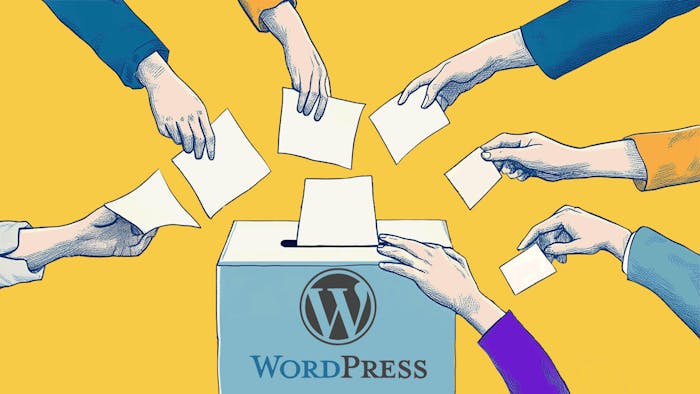The CEO of Yoast has a plan to fix
WordPress
Joost de Valk, the ex-CEO of popular plugin Yoast, wants to democratize WordPress.

The latest chapter of the WordPress drama has been written.
Following head honcho Matt Mullenweg's announcement that WordPress is pausing a few of their services over the holidays, Joost de Valk, the ex-CEO of Yoast, a WordPress SEO plugin with over 13 million active installations, has written a proposal.
Basically, de Valk has had enough of the Mullenweg dictatorship.
How we got here
For those unaware, WordPress has been undergoing a civil war for the last three months due to a feud between Mullenweg and WP Engine, one of the largest WordPress hosting services and key competitor to Automattic, Mullenweg's own hosting company.
We wrote an explainer back in September, but the TLDR is that Mullenweg is upset about WP Engine using the WordPress trademark and not contributing enough to WordPress's open source foundation. WP Engine responded by accusing Mullenweg of attempted extortion.
It's been a back and forth legal battle since then, but the thing that has really got people concerned is the behavior of Mullenweg. As the kids say these days, he appears to be "crashing out." How else can you describe commandeering one of WP Engine's most popular plugins or forcing WordPress users to pledge their allegiance to pineapple on pizza in order to log in?
:format(webp)/cdn.vox-cdn.com/uploads/chorus_asset/file/25792769/wordpress_pineapple_pizza_login.png)
Naturally, this has people quite fed up. Open source legends like David Heinemeier Hansson are begging Mullenweg to reel it back in. A group of long-time WordPress contributors just wrote an open letter urging Mullenweg to work with the community again. And now, you have the latest blog post from de Volk.
Democratizing governance
The overarching theme of de Volk's post is that Mullenweg is no longer a benevolent dictator. Thus, for WordPress to survive and thrive in the future, it must live up to its “Democratizing publishing” tagline by democratizing its governance.
To do so, de Volk offered a five-point plan:
A WordPress foundation like entity becomes the lead of the project, and gets a board of industry people, from diverse backgrounds.
Wordpress.org and all other important community assets that are currently “Matt’s private property” are handed over to that foundation.
The WordPress trademark is given to the public domain or otherwise dealt with in such a way that every company can freely say that they do “WordPress hosting” or “WordPress support.”
People and companies can become sponsors of this WordPress foundation like entity. These sponsors then receive perks like listing them on a hosting page that are disclosed transparently.
Several small teams responsible for architecture, product, and events are created.
It's time to federate
The other change that de Valk wants to see is the Federated and Independent Respositories (FAIR).
Basically, FAIR would be mirrors of WordPress.org that would share data with each other. The idea is that by democratizing the plugin ecosystem beyond just WordPress.org, you would be have a system where one man can't unilaterally wreak havoc.
And, unlike his previous five points, de Valk believes the community can create FAIR even without Mullenweg's permission, a point that Mullenweg disputes.

What does this mean for indie hackers?
In the short-term, it likely means nothing. Any change will take a while, and judging from Mullenweg's response, won't come without a fight.
In the long-term, it is clear that the leaders of the WordPress ecosystem are committed to restoring the platform to it's former glory. If they are able to succeed, then building on WordPress will once again be a viable option.

The ongoing conflict in the WordPress ecosystem reflects the challenges of balancing open-source principles with the demands of leadership and innovation. Joost de Valk's five-point plan and his advocacy for democratized governance are thought-provoking steps towards restoring balance and trust within the community.
By proposing a foundation-led governance model and FAIR (Federated and Independent Repositories), de Valk aims to decentralize power and create a more inclusive environment. If implemented, this approach could resolve longstanding grievances, ensure transparency, and empower contributors across the board.
However, any significant change, particularly those that wrest control away from entrenched leadership, is bound to face resistance. Matt Mullenweg’s influence on WordPress is undeniable, and his response to these proposals will be pivotal. The community's ability to rally around these ideas, build consensus, and push forward collectively will ultimately determine their success.
For developers, small businesses, and indie hackers, this situation is a reminder of the fragility of ecosystems tied to centralized decision-making. The long-term viability of WordPress depends on its ability to adapt to these governance challenges, safeguard the interests of its diverse user base, and uphold its mission of democratizing publishing.
As the drama unfolds, it will be crucial for stakeholders to stay engaged, voice their concerns, and contribute constructively to ensure a thriving future for WordPress.
4o
Joost de Valk's proposal to democratize WordPress governance is a bold move to restore its open-source roots. It's interesting to see how this might shape the future of WordPress. For those interested in exploring more about tech and development, check out rookiesideloader.
So you would recommend to skip using wordpress when developing/launching a new website for a while?
Wordpress drama is like school kids fight.
It will definitely end-up in destroying the wordpress eco system.
Wordpress organization has a lot to learn from other opensource organizations like linuxfoundation.
Fair Enough!
The CEO of Yoast aims to improve WordPress by addressing core issues and enhancing its functionality for better user experiences. For reliable WordPress hosting, check out Hostever.